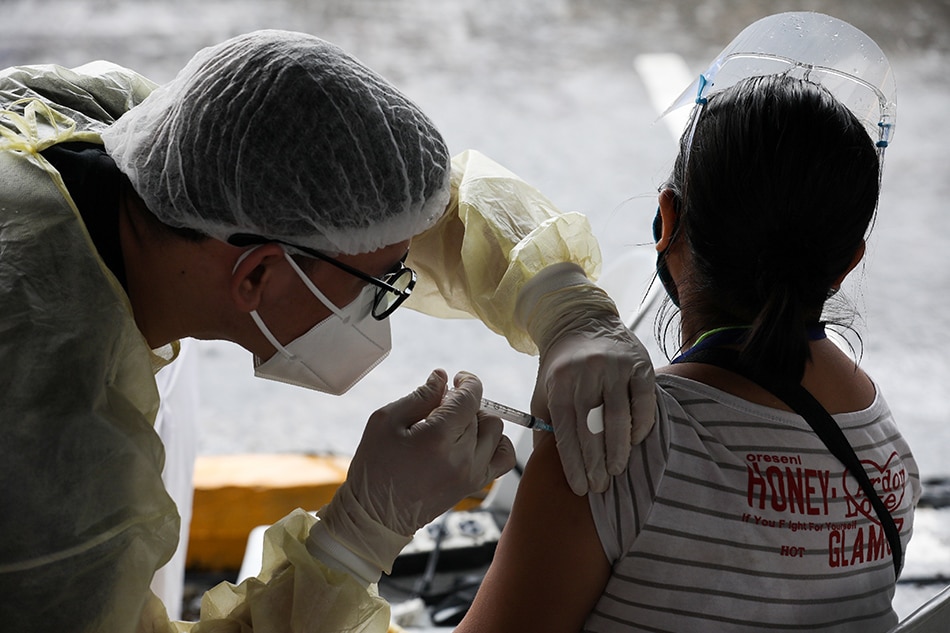COVID-19: Vaccination, hospital capacity monitoring must continue, says expert | ABS-CBN
ADVERTISEMENT

Welcome, Kapamilya! We use cookies to improve your browsing experience. Continuing to use this site means you agree to our use of cookies. Tell me more!
COVID-19: Vaccination, hospital capacity monitoring must continue, says expert
COVID-19: Vaccination, hospital capacity monitoring must continue, says expert
ABS-CBN News
Published May 06, 2023 09:42 AM PHT
MANILA - Some COVID-19 protocols must continue despite the lifting by the World Health Organization of its highest alert regarding the respiratory disease that has claimed nearly 7 million lives globally, an infectious disease expert said Saturday.
MANILA - Some COVID-19 protocols must continue despite the lifting by the World Health Organization of its highest alert regarding the respiratory disease that has claimed nearly 7 million lives globally, an infectious disease expert said Saturday.
According to Dr. Rontgene Solante, chairman of the Adult Infectious Diseases and Tropical Medicine at the San Lazaro Hospital, the lifting of the global health emergency declaration for COVID-19 does not mean the pandemic has ended.
According to Dr. Rontgene Solante, chairman of the Adult Infectious Diseases and Tropical Medicine at the San Lazaro Hospital, the lifting of the global health emergency declaration for COVID-19 does not mean the pandemic has ended.
“May mga protocols tayong kailangan pa rin nating panatilihin. I think kasama diyan yung how we will incorporate yung vaccination sa programa natin, na we need to continue to protect the population, especially yung population at high risk ang mortality, yung vulnerable population,” he told ABS-CBN’s TeleRadyo.
“May mga protocols tayong kailangan pa rin nating panatilihin. I think kasama diyan yung how we will incorporate yung vaccination sa programa natin, na we need to continue to protect the population, especially yung population at high risk ang mortality, yung vulnerable population,” he told ABS-CBN’s TeleRadyo.
“Importante pa rin 'yan dahil alam natin that the virus continues to mutate, and there are (members of the) population at high risk of getting the infection, that can also get the more severe infection,” he added.
“Importante pa rin 'yan dahil alam natin that the virus continues to mutate, and there are (members of the) population at high risk of getting the infection, that can also get the more severe infection,” he added.
ADVERTISEMENT
Solante said surveillance of cases and monitoring of the capacity of medical facilities to handle coronavirus infections should also be sustained.
Solante said surveillance of cases and monitoring of the capacity of medical facilities to handle coronavirus infections should also be sustained.
The Department of Health said Friday evening it will convene members of the Inter-Agency Task Force for Emerging Infectious Diseases (IATF-EID) to reassess policies and other guidelines on COVID-19.
The Department of Health said Friday evening it will convene members of the Inter-Agency Task Force for Emerging Infectious Diseases (IATF-EID) to reassess policies and other guidelines on COVID-19.
The WHO on the same day lifted the global health emergency declaration on COVID-19, citing the increasing population immunity because of vaccination and infection, decreasing mortality and easing of pressure on health systems.
The WHO on the same day lifted the global health emergency declaration on COVID-19, citing the increasing population immunity because of vaccination and infection, decreasing mortality and easing of pressure on health systems.
The UN health agency first declared the so-called public health emergency of international concern (PHEIC) over the crisis on January 30, 2020.
The UN health agency first declared the so-called public health emergency of international concern (PHEIC) over the crisis on January 30, 2020.
As of May 3, the WHO has logged more than 765 million COVID-19 cases, of which over 6.9 million resulted in deaths.
As of May 3, the WHO has logged more than 765 million COVID-19 cases, of which over 6.9 million resulted in deaths.
In the Philippines, close to 4.1 million cases have been confirmed as of Friday, including 9,159 that are active and 66,444 deaths.
In the Philippines, close to 4.1 million cases have been confirmed as of Friday, including 9,159 that are active and 66,444 deaths.
It is "with great hope that I declare COVID-19 over as a global health emergency", WHO chief Tedros Adhanom Ghebreyesus told reporters on Friday, estimating that the pandemic had killed "at least 20 million" people -- nearly three times the under seven million deaths officially recorded.
It is "with great hope that I declare COVID-19 over as a global health emergency", WHO chief Tedros Adhanom Ghebreyesus told reporters on Friday, estimating that the pandemic had killed "at least 20 million" people -- nearly three times the under seven million deaths officially recorded.
But, Tedros warned, the decision did not mean the danger was over, cautioning that the emergency status could be reinstated if the situation changes.
But, Tedros warned, the decision did not mean the danger was over, cautioning that the emergency status could be reinstated if the situation changes.
"The worst thing any country could do now is to use this news as a reason to let down its guard, to dismantle the systems it has built, or to send the message to its people that COVID-19 is nothing to worry about," he said.
"The worst thing any country could do now is to use this news as a reason to let down its guard, to dismantle the systems it has built, or to send the message to its people that COVID-19 is nothing to worry about," he said.
- With a report from Agence France-Presse
Read More:
COVID-19
COVID
coronavirus
Rontgene Solante
pandemic
WHO
global health emergency
World Health Organization
health
health protocols
ADVERTISEMENT
ADVERTISEMENT



